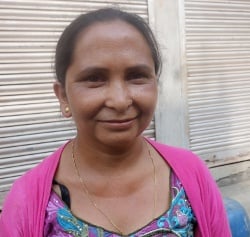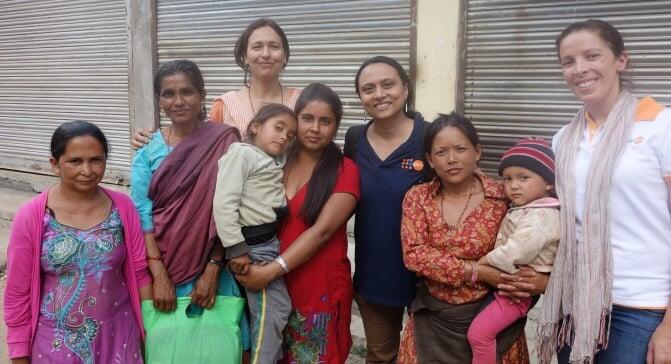SINDHUPALCHOWK, Nepal – Rapidly expanding their operations in the field, UNFPA personnel visited Sindhupalchok District – one of the worst-hit by the Nepal earthquake – to meet pregnant and lactating mothers whose homes were destroyed in the town of Sangchok.
For Sita Paudel, a paralegal worker in the area, finding dozens of such women in less than an hour was not very difficult, as virtually every house in this tiny town has been either completely destroyed or badly damaged. When the UNFPA team arrived a few hours later, Sita had gathered a group of over 70 young women.
Helping to restore dignity
The women looked at the 100 or so packets unloaded from the vehicle with palpable interest. "How much money will we get?", some whispered, while others wanted to know why they were only distributed to pregnant and lactating mothers.
Upama Malla, from the UNFPA Nepal Country Office, and Mamata Bushta, from the Nepal Government's Department of Women and Children, explained that it was neither cash, nor something for their family members, but dignity. As the two started pulling out one item at a time from a packet, and explaining the importance of each, the women were visibly delighted that someone had understood their special needs in these difficult times.
Sanitary napkins, maxi, shawl, towel, soap, nail cutter, toothbrush and toothpaste, and even a tiny torch for their safety after dark - it was all there in the packets being distributed. Click here to see the Dignity Kit for Nepal.
Dignity kits: A UNFPA trademark
While responding to the devastating Indian Ocean tsunami of 2004, UNFPA was the to first to introduce Dignity Kits for pregnant and lactating mothers, as well as young girls. Since then, these kits have become standard practice in emergency responses across the world, not only for UNFPA, but also for other humanitarian service organizations.
"We have been procuring dignity kits locally and rushing in thousands more from India, Pakistan and other countries in the current situation," said Giulia Vallese, UNFPA Representative in Nepal. "Many of the ones purchased in Nepal have been locally packed by youth volunteers at our office compound in Kathmandu, to ensure we can reach the maximum number of affected women in the minimal possible time".

Q&A with Sita Paudel, Paralegal in Sangchok VDC, Sindhupalchok District
After the Dignity Kits had all been handed over to the women of Sangchok, we had the opportunity to sit down with Ms. Paudel and ask her a few questions:
Q: Do you think the women in your village will find the Dignity Kits useful?
A: You saw how they were clutching the packets when they walked away! It's easy to make out how much they value what they were given.
Q: Where are these Dignity Kits needed the most?
A: It will be a while before life here comes back to normal. So, wherever you can reach, these items will be appreciated. However, we urgently need to go deeper into the Sangchok Village Development Committee, which consists of nine villages. I have been carrying tarpaulins to remote villages, and I know how bad the situation is for women out there - especially those whose entire families have been wiped out.
Q: Which items from the Dignity Kit do you think would be most appreciated?
A: I asked the women this very question! Actually it is a tough question! But I think it was the sanitary pads, gown and torch that they valued the most. Personal hygiene and personal safety together help restore a sense of dignity - and at this terrible time this perhaps is what a woman or young girl values the most.




